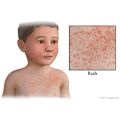Condition Basics
What is rubella?
Rubella is a very contagious (easily spread) illness caused by the rubella virus. It is usually a mild illness. But in rare cases, it may cause more serious problems.
If you are pregnant and get infected with the rubella virus, you are at risk for miscarriage. And your baby (fetus) could become infected too. This can cause birth defects, including serious defects known as congenital rubella syndrome (CRS). CRS can cause hearing loss, eye problems, heart problems, and other complications.
Rubella also is called German measles or 3-day measles.
How is it spread?
The rubella virus most often is spread through droplets of fluid from the mouth, nose, or eyes of someone who has the infection. A person who has the infection can spread these droplets by coughing, sneezing, talking, or sharing food or drinks. You can get infected by touching something that has the droplets on it and then touching your eyes, nose, or mouth before washing your hands.
If you have rubella, you are most likely to spread it a few days before the rash starts until 5 to 7 days after the rash first appears. But you can spread the virus even if you don't have any symptoms.
If you've had rubella, it is very unlikely that you will get it again.
What are the symptoms?
Symptoms of rubella may include:
- A fever.
- Swollen glands (lymph nodes), especially behind the ear and at the back of the head.
- A mild rash that starts on the face and spreads to the neck, the chest, and the rest of the body.
Adults also may have joint pain. Older children and teens also may have eye pain, a sore throat, and body aches. Young children may have only a rash.
Symptoms may not start until about 14 to 21 days after you've been near someone who has the infection. Some people don't have symptoms.
How is it diagnosed?
A blood test can help your doctor find out if a recent infection you've had was caused by the rubella virus. The test also shows if you have been immunized against rubella or are immune to the virus.
How is rubella treated?
Rubella usually gets better with home care.
- Use medicines to reduce fever and body aches. Do not give aspirin to anyone younger than age 20. It has been linked to Reye syndrome, a serious illness.
- Drink extra fluids.
- Get plenty of rest.
Stay away from other people, especially pregnant people, as much as you can so that you don't spread the illness. If you or your child has rubella, don't go to work, school, or day care for 7 days after the rash first appears.
If you're exposed to the rubella virus while pregnant, talk to your doctor. They may give you a shot of immunoglobulin (IG) if testing shows that you are not immune. IG doesn't prevent infection, but it may make symptoms less severe. It also lowers the chance of birth defects, although it doesn't always prevent them. A child with congenital rubella syndrome has been born to someone who has received IG.
How can you prevent it?
The rubella vaccine protects against the illness. The vaccine is part of the MMR (measles, mumps, and rubella) and MMRV (measles, mumps, rubella, and varicella [chickenpox]) vaccines. Most children get the vaccine as part of their regular shots.
If you are planning to become pregnant and don't know if you're immune to rubella, get a blood test to find out. If you're not immune, you can safely get the rubella vaccine up to 1 month before you become pregnant. If you're not immune and didn't get the vaccine before you became pregnant, take extra care to avoid contact with the virus. Avoid the saliva of babies and young children, and wash your hands often.
